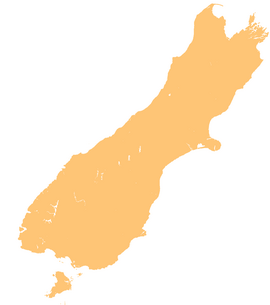Seaforth River
| Seaforth River | |
|---|---|
 Gair Loch in 1897, River Seaforth | |
 Route of the Seaforth River | |
| Location | |
| Country | New Zealand |
| Region | Southland |
| District | Southland |
| Physical characteristics | |
| Source | |
| • coordinates | 45°31′51″S 167°05′56″E / 45.5308°S 167.0990°E |
| Mouth | |
• location | Supper Cove, Tamatea / Dusky Sound |
• coordinates | 45°41′51″S 166°57′36″E / 45.6975°S 166.9599°E |
• elevation | 0 metres (0 ft) |
| Basin features | |
| Progression | Seaforth River → Supper Cove → Tamatea / Dusky Sound → Tasman Sea |
| Tributaries | |
| • left | Kintail Stream, Bessie Burn, Deadwood Creek, Jane Burn, Roa Stream |
| • right | Kenneth Burn, Bishop Burn, Macfarlane Stream, Henry Burn |
| Waterbodies | Gair Loch |
The Seaforth River is a river in New Zealand, flowing into Dusky Sound.[1] About 9 km (5.6 mi) and 41 m (135 ft) up from Supper Cove in Dusky Sound is Lake Maree. The river rises about another 20 km (12 mi) to the north, on the slopes of the Black Giants, at about 1,300 m (4,300 ft).[2] Like many former British Empire locations, it and its lakes have Scottish names.
The river was first mapped in 1896 by Thomas Mackenzie, who was briefly Prime Minister in 1912.[3] He described cataracts of 10 ft (3.0 m), 25 ft (7.6 m) and 60 ft (18 m) between the Sound and the Loch[4] and named the river after himself.[3] However, in 1897 E. H. Wilmot discovered that the Mackenzie and Seaforth were the same river and removed the former name.[5] The route Mackenzie followed is now part of the Dusky Track.[6] It was thought that few had followed the route until at least 1950.[7]
Carbon dating of beech tree stumps in Lake Maree indicate it was formed when a large rock fall dammed the river during the 1826 earthquake.[8] Near Kintail Hut, Gair Loch is another debris dammed lake.[9] Further debris fell, probably during the 2011 Christchurch earthquake.[10]
Mackenzie described the vegetation as mainly birch, with red-pine, rata, and some totara. He said that there were also ribbon-wood, panax, mikimiki, pepper-tree, mokomoko, tutu, ferns and mosses.[11]
A 1981 survey identified six native fish - Anguilla dieffenbachii, Prototroctes oxyrhynchus, Galaxias maculatus, Galaxias fasciatus, Galaxias brevipinnis and Gobiomorphus huttoni.[12]
Moose were liberated in the valley in 1910,[13] but it is not thought that they survived.[6]
See also
[edit]References
[edit]- ^ "Place name detail: Seaforth River". New Zealand Gazetteer. Land Information New Zealand. Retrieved 18 March 2018.
- ^ "Seaforth River, Southland". NZ Topo Map. Retrieved 4 August 2019.
- ^ a b "1896 Department of Lands and Survey Annual Report". paperspast.natlib.govt.nz. Retrieved 4 August 2019.
- ^ "1896 Department of Lands and Survey Annual Report". paperspast.natlib.govt.nz. Retrieved 4 August 2019.
- ^ "Department of Lands and Survey Annual Report". paperspast.natlib.govt.nz. 1 January 1897. Retrieved 4 August 2019.
- ^ a b "Dusky Track" (PDF). Department of Conservation.
- ^ A. H. Reed (4 September 1950). "Through The Rain Forests From Manapouri To Dusky. Otago Daily Times". paperspast.natlib.govt.nz. Retrieved 5 August 2019.
- ^ Hancox, G. T.; Langridge, R. M.; Perrin, N. D.; Vandergoes, M.; Archibald, G. (August 2013). "Recent mapping and radiocarbon dating of three giant landslides in northern Fiordland, New Zealand, GNS Science Report 2012/45" (PDF).
{{cite web}}: CS1 maint: multiple names: authors list (link) - ^ "Southland District Plan Section 6" (PDF). 27 June 2001.
- ^ "From Dawn to Dusky". 1 May 2017. Retrieved 4 August 2019.
- ^ "1896 Department of Lands and Survey Annual Report". paperspast.natlib.govt.nz. Retrieved 4 August 2019.
- ^ R. M. MCDowall (April 1981). "Freshwater fish in Fiordland National Park" (PDF). NIWA.
- ^ "Southland Times". paperspast.natlib.govt.nz. 29 March 1910. Retrieved 5 August 2019.


 French
French Deutsch
Deutsch

